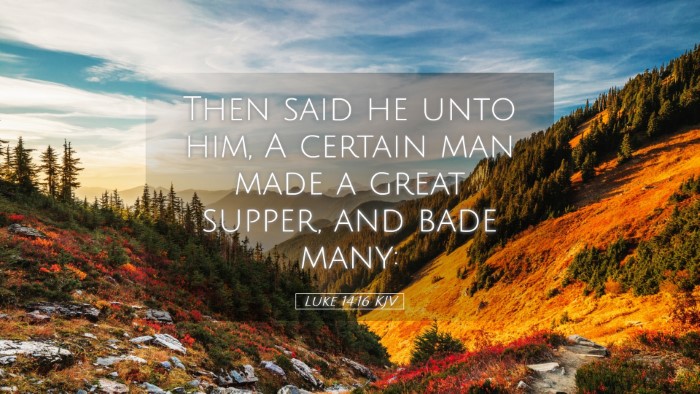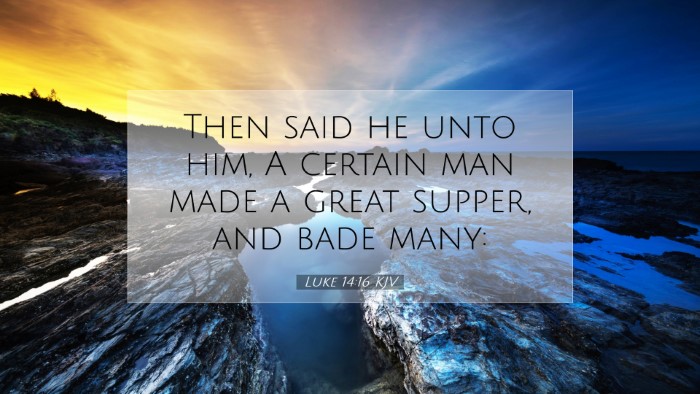Commentary on Luke 14:16
In Luke 14:16, we find a profound parable that Jesus uses to convey deep spiritual truths. The verse states: "A certain man made a great supper, and bade many." This passage serves as a starting point for a rich exploration of themes such as invitation, rejection, and the Kingdom of God.
Contextual Background
Jesus shares this parable during a meal with Pharisees, a setting that adds layers of meaning to the text. The act of dining is significant in Jewish culture, often implying fellowship and acceptance. By addressing these themes, Jesus aims to challenge social norms and provoke thought regarding the true nature of His Kingdom.
Commentary Insights
Invitation to Feast
Matthew Henry notes that the "great supper" symbolizes the gospel invitation extended by God. The supper represents the rich blessings of salvation, grace, and eternal life. The "certain man" illustrates God Himself, who earnestly desires to gather many into His presence.
Response to the Invitation
Albert Barnes highlights that the invitation to the supper requires a response, which is depicted through the guests’ actions. The invitation is universal, yet the responses are varied and reveal the hearts of those invited. Here, we see a model of how the gospel is presented and the human inclination to reject divine offers.
Spiritual Insights
Adam Clarke elucidates that the guests' refusal to attend the supper reflects the common human distractions and excuses that prevent people from fully engaging with God's calling. The parable illustrates how worldly concerns can eclipse spiritual realities, a nuanced point that resonates today as much as it did in Jesus' time.
Theological Implications
- The Nature of God's Invitation: This parable underscores that God's invitation is gracious and proactive. He cares for all His creation and seeks to offer them a place at His table.
- The Tragedy of Rejection: The guests who refuse the invitation highlight a tragic reality of human free will—the ability to turn away from God's gracious offers. Theologies of grace and human response interact notably here.
- The Expansion of the Kingdom: The parable goes on to emphasize the inclusion of others who may traditionally be marginalized, illustrating God's desire for all to come to Him. This leads to discussions on the inclusivity of the gospel.
Application for Pastors and Theologians
This verse invites pastors and theologians to reflect deeply on their own ministry. The responsibility of extending God's invitation is profound; leaders must not lose sight of the urgency and significance of this call.
Encouragement for Preaching and Teaching
As preachers prepare to share this text, they can draw from the insights of Henry, Barnes, and Clarke to emphasize the importance of understanding how contemporary distractions can prevent individuals from fully embracing God's invitation. Sermons could engage with the personal applications of receptivity to God’s call and the consequences of ignoring such invitations.
Practical Responses
Incorporating prayer and reflection on the barriers that might keep congregants from responding to God can be beneficial. How can the church help address these distractions? Only through fostering an environment where God's invitation is continually proclaimed and where barriers are broken down can we truly fulfill the mission of the church.
Conclusion
Luke 14:16 serves as a starting point for a rich exploration of God's Kingdom and our responses to His gracious invitation. By synthesizing insights from public domain commentaries, we gain a comprehensive understanding of this verse's implications for individuals and communities alike.


